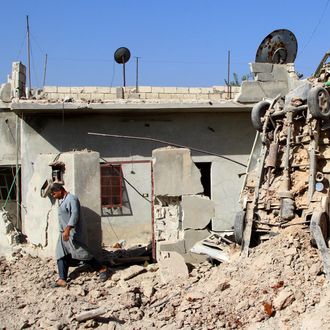
Relations between the United States and Russia have been profoundly tense ever since the Kremlin began air strikes in Syria in support of the Bashar al-Assad regime at the end of September. The skies above Syria have also gotten dangerously crowded, as both Russian and U.S.-led coalition forces drop bombs and fly drones above the war-torn state. Last week the U.S. said the countries’ aircraft came within as little as ten miles of each other, a precarious distance that points to the potential for serious disasters.
So while the two countries don’t agree on much right now — the U.S. believes Russia is complicating the Syrian situation by attacking the coalition-backed rebels opposed to Assad, rather targeting ISIS strongholds — they do agree the risk of any lethal accidents or near-misses is far worse than the current standoff. On Tuesday, the two sides reached a bare-bones deal to help avoid any catastrophes between U.S. and Russian aircraft. The details of the agreement weren’t released per the request of the Russian defense ministry, but the two countries agreed that pilots should stay “professional” and keep a “safe distance,” much like feuding co-workers or preschoolers. Russia and the U.S. will also communicate over designated frequencies and will establish a ground communication system, which will serve as a “backup,” according to the Times, in case the in-air frequencies fail. The two nations will also set up a working group to help implement the deal.
The United States made it clear that the terms of the agreement do nothing to change how the Obama administration feels about Russia’s mission focus in Syria. State Department spokesperson John Kirby told NPR, “It’s not a treaty of cooperation or anything like that,” and the Department of Defense echoed that sentiment, stressing that the two sides won’t share intelligence or target information. “We continue to believe that Russia’s strategy in Syria is counterproductive and their support for the Assad regime will only make Syria’s civil war worse,” said Peter Cook, the press secretary for the Department of Defense.
Russia, meanwhile, is keeping up its “who me?” act, basically saying they would just love to cooperate with the U.S. on more than just “technical” things, if only Washington would stop being such sticklers on the whole pro-Assad thing. Russia’s deputy defense minister, Anatoly Antonov, said this preliminary deal “shows a big potential for cooperation between Russia and the U.S., including in the fight against terrorism, which we are ready to expand and deepen.” Russia also apparently sought U.S. commitments that they’d come to Russia’s aid (and vice versa) for emergency and rescue missions, or in the event that aircraft were shot down. The U.S. apparently responded with a big “no.”
Still, next week, U.S. Secretary of State John Kerry will apparently again push Russia to abandon its support of Assad and cease its assault on anti-regime rebel forces, some of which had the tacit support of the Obama administration. Russia still maintains it is targeting ISIS-held areas, but recent reports indicate otherwise. Reuters reports that Russia has taken out an opposition-forces commander and four fighters in the Latakia province on Monday, where estimates have put the death toll at 45, including at least 15 civilians.





























